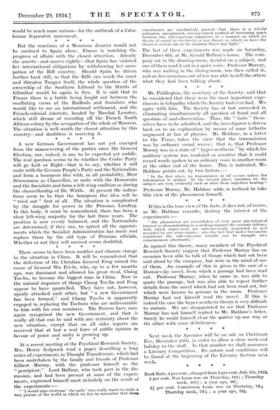If this is the true view of the facts, it
does not, of course, as Mr. Haldane remarks, destroy the interest of the experiments :— " The phenomena are nevertheless of very great physiological interest as demonstrating in a striking manner the extreme delicacy with which impressions aro subconsciously responded to and recorded by our sense-organs ; also tho fact that under favourable conditions the sub-conscious records can be brought into consciousness afterwards."
As against this theory, many members of the Psychical Research Society suggest that Professor Murray has on occasion been able to talk of things which had not been said aloud by the company, but were in the mind of one of them. An example of this is given in the case of a Dostoievsky novel, from which a passage had been read out. Professor Murray, when he came in, was able to quote the passage, but was also able to repeat further details from the novel which had not been read out, but which were known to persons in the room. Professor Murray had not himself read the novel. If this is indeed the case the hyper-aesthesia theory is very difficult to sustain. We are disappointed to see that Professor Murray has not himself replied to Mr. Haldane's letter. Surely he could himself clear the matter up one way or the other with some definiteness.










































 Previous page
Previous page